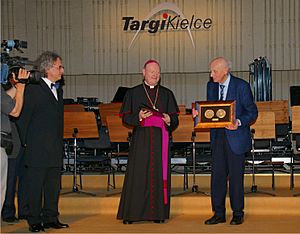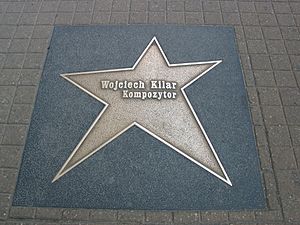Wojciech Kilar facts for kids
Quick facts for kids
Wojciech Kilar
|
|
|---|---|

Kilar in 2006
|
|
| Born | 17 July 1932 Lwów, Poland
|
| Died | 29 December 2013 (aged 81) Katowice, Poland
|
| Nationality | Polish |
| Occupation | Composer |
| Spouse(s) |
Barbara Pomianowska
(m. 1966; died 2007) |
Wojciech Kilar (born July 17, 1932 – died December 29, 2013) was a famous Polish composer. He wrote both classical music and film music. One of his biggest achievements was creating the music for Francis Ford Coppola's movie Bram Stoker's Dracula in 1992. For this, he won an ASCAP Award. In 2003, he also won a César Award for his music in the movie The Pianist.
Contents
About Wojciech Kilar
Wojciech Kilar was born in Lwów, Poland, on July 17, 1932. His father was a doctor, and his mother was an actress. From 1948, Kilar lived most of his life in Katowice, a city in Southern Poland. He was married to Barbara Pomianowska, a pianist, from 1966 until her death in 2007. They met when he was 22 and she was 18.
His Education and Learning
Kilar started learning piano and music theory at a young age. He studied piano with Maria Bilińska-Riegerowa and harmony with Artur Malawski. In 1948, he moved to Katowice and finished music school there. He then went to the State College of Music in Katowice. He studied piano and composition and graduated with top honors in 1955.
He continued his studies in Kraków from 1955 to 1958. In 1957, he attended a special music course in Darmstadt. From 1959 to 1960, he received a scholarship to study composition in Paris with the famous teacher Nadia Boulanger.
His Music Career
Wojciech Kilar was part of an exciting new music movement in Poland in the 1960s. This was called the New Polish School. He helped start the Karol Szymanowski Society in Zakopane in 1977. He also led the Katowice branch of the Association of Polish Composers for many years.
Kilar first started writing music for films in 1959. He became very successful as a classical composer. He wrote music for over 100 Polish movies. He worked with famous Polish directors like Krzysztof Kieślowski and Andrzej Wajda. His music was also used in movies made in France and other parts of Europe.
His first English-language film was Francis Ford Coppola's Dracula. He also composed music for other well-known English movies. These included Roman Polanski's Death and the Maiden (1994), The Ninth Gate (1999), and The Pianist (2002). His film music often used deep bass and cello sounds. It also had romantic themes and simple, repeating musical patterns.
Besides his film work, Kilar kept writing classical music. Some of his famous classical pieces include Exodus and his September Symphony (2003). His music often used simple melodies and big, powerful sounds. He sometimes used Polish Highlander folk melodies in his pieces.
His Later Life and Passing
In the summer of 2013, Kilar started feeling unwell. In September, he was diagnosed with a serious illness. He had surgery, which went well, and he felt hopeful. He also had treatments for several weeks.
In December 2013, Kilar returned home to Katowice. His niece took care of him. He passed away peacefully on December 29, 2013, at the age of 81. His funeral was held on January 4, 2014, in Katowice. He was laid to rest next to his wife.
His Important Works
Later in his life, Kilar focused more on writing symphonic music and pieces for choirs and solo instruments. In 2001, his Missa pro pace (Mass for Peace) was performed for the first time in Warsaw. This piece was written for a full symphony orchestra, choir, and solo singers. It was performed again in the presence of Pope John Paul II.
His 1984 composition Angelus was used in the movie City of Angels. Another piece, Orawa from 1988, was used by the Santa Clara Vanguard in their 2003 show.
After 2000, Kilar started creating more large-scale concert works. These included his September Symphony (2003), Magnificat (2006), and Te Deum (2008). He believed that simple, lasting sounds were the deepest wisdom in music.
His music has been performed by many major orchestras around the world. These include the Philadelphia Orchestra, the Cleveland Orchestra, and the New York Philharmonic.
Awards and Honors
Wojciech Kilar received many awards for his amazing music. Some of these include:
- The French Lili Boulanger Prize for composition (1960).
- Awards from the Polish Ministry of Culture and Arts (1967 and 1976).
- The Alfred Jurzykowski Foundation Award from the USA (1984).
- The Polish Cultural Foundation Award (2000).
His film music also earned him many honors:
- He won the best score award for Ziemia obiecana (The Promised Land) in 1975.
- He received the Prix Louis Delluc in 1980 for the animated film Le Roi et l'Oiseau / The King and the Mockingbird.
- In 1993, he shared the ASCAP Award for his music in Francis Ford Coppola's Bram Stoker's Dracula. He was also nominated for a Saturn Award for this film.
- In 2003, he won the César Award for Best Music for The Pianist. He also received a BAFTA nomination for this movie.
Kilar also received high honors from the Polish government. He was decorated with the Cavaliers' Cross of the Order of Polonia Restituta in 1976. In 2008, he received the Grand Cross of the Order of Polonia Restituta, which is a very important award.
Political Views
During the 2007 election in Poland, Wojciech Kilar publicly shared his support for the Law and Justice political party.
See also
 In Spanish: Wojciech Kilar para niños
In Spanish: Wojciech Kilar para niños
- List of Polish composers
- List of Poles
- Music of Poland
 | Kyle Baker |
 | Joseph Yoakum |
 | Laura Wheeler Waring |
 | Henry Ossawa Tanner |




